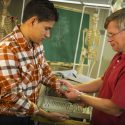49-year-old Renaissance man wants to make surgery his new career
What else can a former carpenter, landscaper, magazine editor, beekeeper and chicken farmer possibly do with his life?
How about becoming a plastic surgeon?
Such is the case with 49-year-old Vincent Laurence, a soon-to-be graduate of the UW School of Medicine and Public Health.
During the school’s Match Day ceremony last week, Laurence found out he would be serving a six-year residency in plastic and reconstructive surgery at the University of California-Irvine. It was a thrilling moment for Laurence, whose life has been filled with a number of interesting journeys.
Laurence grew up in Massachusetts and, after a stint in the Marines, studied English at Vassar College. He also worked 60 to 70 hours a week in carpentry during summer breaks to pay for his tuition.
He was on the road to becoming a teacher, but then he had a change of heart.
“At some point, I decided I didn’t want to be an academic,” he says. “I kept on doing my carpentry because it was satisfying and manually dexterous.”
Unfortunately, Laurence made his decision before an economic recession hit the country, and carpentry jobs suddenly became scarce. It was about this time that “Fine Homebuilding” magazine, published by the Taunton Press in Connecticut, was looking for an editor who understood carpentry and had a command of English.
“I was basically their guy,” says Laurence.
He would also work at Taunton’s other magazines, “Fine Woodworking” and “Fine Gardening,” and eventually take up beekeeping, serving a term as vice-president of the Backyard Beekeepers Association of Connecticut. And he raised chickens for 10 years.
With several years at Taunton under his belt, Laurence decided he needed a job where he could work with his hands and began his own garden-design installation business.
After building a successful clientele, he says he had an epiphany on where his life was heading.
“I was just finishing a job, the client loved it and it was the end of a perfect day,” says Laurence. “And I kept saying ‘Is this it? Is this what I’m going to do for the rest of my life?'”
A career aptitude test determined he could enter a number of different careers. But only one appealed to him: surgery.
However, Laurence was past 40 years old and thought it was too late to study medicine.
“At first, I kicked myself, thinking I had missed out on an incredible perfect blending of cerebral stimulation where what you are doing everyday is manually dexterous,” he says. “I would have been working with my hands, and performing a craft while accomplishing a greater good.”
Laurence decided to take the plunge. First, he had to take three years of science courses before entering the SMPH. By that time, he was 45. Laurence says going to Wisconsin was the best decision he could have made.
“Everybody has been nice and everybody has been positive,” he says. “The facilities are fantastic.”
He has never felt out of place, even though most of his classmates were much younger.
“I feel younger than my age, almost ageless,” he says. “People can be 20 years old and have a 60-year-old mindset, or they can be my age and just roll with things.”
He still falls back on his carpentry and landscaping work to relieve the stress of his studies. Some of his woodworking has been displayed at the annual art show at Ebling Library in the SMPH. He also landscaped two plots at the Eagle Heights Community Garden in Madison.
“There are a lot of things I know and come back to for comfort,” he says. “Carpentry and landscaping are definitely stress relievers.”
After graduation, Laurence looks forward to starting his new career in plastic surgery, which he says replicates the challenges he encountered as a woodworker and landscaper.
“There’s a lot of creative problem-solving involved,” he says. “If you have a person who has lost a portion of their face due to cancer, or injured their arm and no longer has bicep function, a plastic surgeon can assess the problem and determine how to solve it.”
“No amount of classes, books, magazines or videos will ever teach you the fundamentals of woodworking,” he adds. “You have to have the tools and set your mind toward making something. There’s a feedback one gets with tools that also applies toward surgery. You’re working with tissue and becoming comfortable and familiar with the physical world. That’s an experience a lot of people don’t have if they have never worked with their hands.”
— By Mike Klawitter


